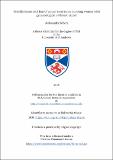Files in this item
Fertility issues and fear of cancer recurrence in young women with gynaecological or breast cancer
Item metadata
| dc.contributor.advisor | Ozakinci, Gozde | |
| dc.contributor.author | Sobota, Aleksandra | |
| dc.coverage.spatial | 536 p. | en_US |
| dc.date.accessioned | 2019-07-30T14:52:24Z | |
| dc.date.available | 2019-07-30T14:52:24Z | |
| dc.date.issued | 2016-11-30 | |
| dc.identifier.uri | https://hdl.handle.net/10023/18205 | |
| dc.description.abstract | Fertility and cancer recurrence fears have been identified as important issues among young cancer patients (1-3), which frequently remain unaddressed (4, 5). This thesis aims to investigate the role that these issues play in the lives of young women diagnosed with breast or gynaecological cancer. This project consisted of three components – a systematic review of literature, a qualitative, and a quantitative study. The literature review included both the quantitative and qualitative evidence and sought to a) identify factors associated with fertility issues; b) characterise the relationship between fertility issues and psychological well-being; and c) explore decision-making about treatments that can affect fertility potential among women diagnosed with cancer during their reproductive years. It used narrative and thematic synthesis as methods of analysis, and provided the rationale for the qualitative and quantitative components of this PhD project. In the qualitative study, twenty-four young women who had finished active cancer treatment were interviewed over the phone about the importance of their fertility at the time of treatment decision-making. In the quantitative study, 164 women completed a survey investigating the determinants of the psychological experience of fertility issues, cancer recurrence fears, and QoL. The Common Sense and the Shared Decision Making Models have been used to frame and analyse the data collected throughout the qualitative and quantitative studies.. The literature review suggests that there is a paucity of evidence with respect to the factors associated with psychological experience of fertility issues among young women with cancer. It indicates, however, that fertility issues can have a profound impact on young women’s post-cancer lives in terms of their QoL and ability to regain normality after cancer treatment. Finally, it provides evidence in favour of the shared decision making being women’s preferred strategy in terms of making choices about treatments that can affect their fertility potential. These findings, and the gaps identified within the literature are addressed by either the qualitative or the quantitative component of this PhD project. The qualitative findings suggest that prior to treatments women engaged in a process of balancing survival and fertility which serves to clarify their priorities with respect to the treatment outcome. When making treatment decisions, women wished: a) to involve their physicians and their significant others, b) to be informed about treatments, and c) for their priorities to be taken into account as much as possible in the process. This is in line with the basic premises of the Shared Decision Making Model. Determinants of the psychological experience of fertility issues, recurrence fears, and QoL have been identified throughout the quantitative study. While some of these determinants differed depending on the psychological outcome, illness perceptions significantly predicted all of them. This supports the assumptions of the CSM which suggests that one’s own conceptualisation of disease plays a key role in adapting to an illness. The findings of this thesis provide insight into the importance of fertility issues and recurrence fears among young women with breast or gynaecological cancer. The use of theories enables the design of potential future interventions to improve the patients’ well-being in survivorship. | en_US |
| dc.language.iso | en | en_US |
| dc.publisher | University of St Andrews | |
| dc.rights | Attribution-NonCommercial-NoDerivatives 4.0 International | * |
| dc.rights.uri | http://creativecommons.org/licenses/by-nc-nd/4.0/ | * |
| dc.subject.lcc | RC281.W65S7 | |
| dc.title | Fertility issues and fear of cancer recurrence in young women with gynaecological or breast cancer | en_US |
| dc.type | Thesis | en_US |
| dc.contributor.sponsor | Danuta Richardson Medical Scholarship | en_US |
| dc.type.qualificationlevel | Doctoral | en_US |
| dc.type.qualificationname | PhD Doctor of Philosophy | en_US |
| dc.publisher.institution | The University of St Andrews | en_US |
| dc.publisher.department | School of Medicine | en_US |
| dc.rights.embargoreason | Embargo period has ended, thesis made available in accordance with University regulations | en |
| dc.identifier.doi | https://doi.org/10.17630/10023-18205 |
The following licence files are associated with this item:
This item appears in the following Collection(s)
Except where otherwise noted within the work, this item's licence for re-use is described as Attribution-NonCommercial-NoDerivatives 4.0 International
Items in the St Andrews Research Repository are protected by copyright, with all rights reserved, unless otherwise indicated.


